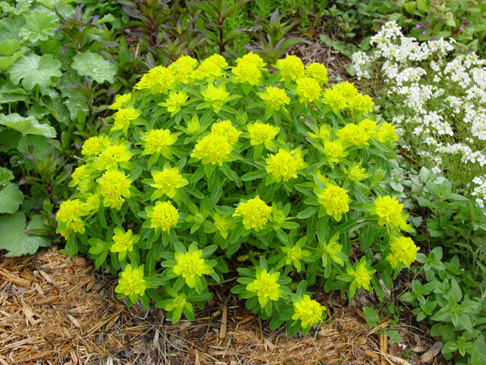I have grown Euphorbia Polychroma or Cushion Spurge in my garden for a long time. It is a beautiful perennial with striking foliage and it blooms chartreuse yellow just after my tulips are finished, adding a much needed punch of color to our yard. It flowers for a long time in late spring and helps bridge the bloom gap between the tulips and the iris and peonies which flower later. Cushion spurge has a flowering habit unlike any other plant in my garden. It produces brightly colored bracts while its’ actual flowers are small, much like the Christmas poinsettia to which it is related. Those bracts are almost a neon yellow and get a lot of comments from visitors.
One way to identify euphorbia is by breaking off a piece of stem and observing the milky white latex sap that emerges. This milky sap evolved as a deterrent to to being eaten by animals and is quite effective. However, since there have been reports of severe reactions to euphorbia sap by some people, spurges should be handled with caution and kept away from children and pets. Any sap on skin should be washed off immediately and thoroughly.
Euphorbia Polychroma is very easy to grow. It does well in our clay soil and seems happy with very little care. It emerges each spring and I just let it grow and bloom until it is finished and begins to look leggy. At that point I cut the foliage down. When it grows back, it does not bloom a second time, but does look fresh and green.





Genie
Yes this is one of my favorite Spring flowers. Milly has a beautiful plant.
Jim O’L